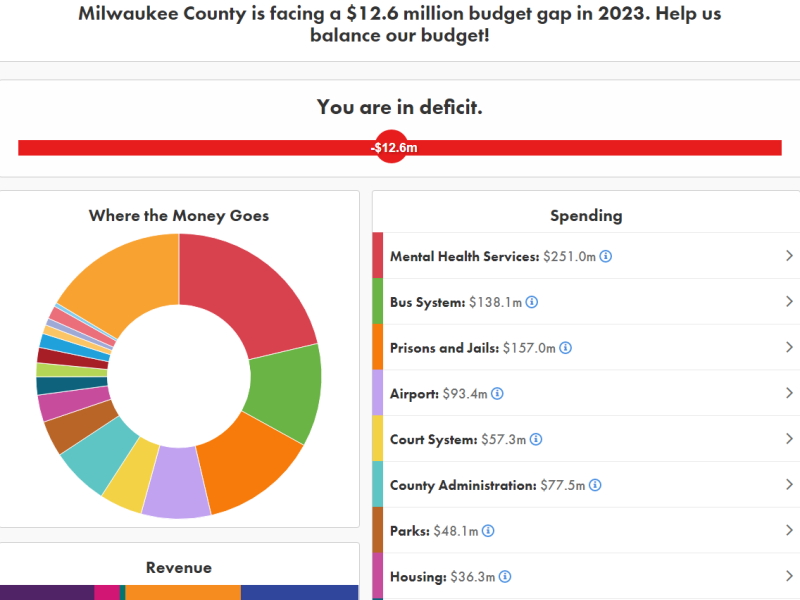County Online Budgeting Tool Falls Short
Voters who try to use it will find it allows budget cuts in few categories of spending.
Milwaukee County just rolled out an online “tool” designed to engage ordinary citizens in the upcoming budget process. Agency and department heads get to submit their requests by August 15th. The actual budget will not be signed into law until sometime in November after the County Board does their work in October. This online tool “Balancing Act” is geared towards allowing individuals to modify revenue and spending amounts to close a projected $12 million budget deficit.
There are some significant drawbacks and limitations that make this online tool an unrealistic way to better understand what is at stake in the county’s budget process. There are 17 broad spending categories. None of them has any specific programs listed or line items in terms of what money goes to staffing, service delivery, material/resource costs, etc.
Of the remaining 14 spending areas, 11 have footnotes indicating that spending reductions are limited by various Federal and State laws or mandated spending: Transit, Mental Health, Pension/Health care, Medical Examiner, Sheriff, 911 Call Center, Elected Offices, Aging, Housing, Courts and Prisons.
That leaves three areas where you could hypothetically make unrestricted budget cuts: Zoo, Parks, and “County Administration.” The first two just happen to be the most popular and recognizable services delivered by the county. The latter involves a large number of back office administrative work. Since serving in the Legislature, I have wondered if county government could merge or consolidate back office services with, say, City of Milwaukee or some other unit of government to achieve cost savings. Needless to say, I am sure it’s complicated.
The footnote for Transit funding does indicate that $7 million could be cut and the Milwaukee County Transit System has a projected year 2025 budget deficit of about $33 million as reported by Urban Milwaukee’s Graham Kilmer (using a five-year forecast from the County Comptroller’s office). Another major issue that Urban Milwaukee has been covering is the looming pension shortfall – just how vulnerable those numbers are to recent market volatility and inflation is hard to tell.
Speaking of deficits, there is an odd item under the Revenue category for a 1 penny sales tax increase which could generate $160 million a year. However, you need to click the “more details” button to find out that this scenario would require changes in state law. All of the spending cut limitations caused by federal or state law are pretty explicit, yet for some reason the sales tax increase is being offered as readily available.
Then there is the timing. Rolling this out in July when practically no ordinary citizen is focused on something like the next county budget seems odd. Similarly, holding public outreach meetings on the budget in the middle of August (right after State Fair?), while families are taking vacations and getting ready for the new school year, also strikes me as counterproductive. The real work of the county budget will not get serious until October.
For the record, there are a lot of good things the county is doing and should have the right support to keep doing. But this online tool makes it difficult for people to seriously engage in the trade-offs and better understand the consequences of various ups and downs from this $1 billion budget. As a supporter of the 1 penny sales tax, Parks, Zoo and Transit funding and a strong safety net, my concern is that the “Balancing Act” invites simplistic, inadequate responses to very important fiscal challenges facing Milwaukee County residents.
Josh Zepnick served in the Wisconsin Legislature from 2003-2019 and holds a Master’s Degree in State and Local Government from the University of Minnesota’s Humphrey Institute for Public Affairs. He was recently a candidate for the Milwaukee County Board on Milwaukee’s South Side.
Political Contributions Tracker
Displaying political contributions between people mentioned in this story. Learn more.
Op-Ed
-
Wisconsin Candidates Decry Money in Politics, Plan to Raise Tons of It
 Dec 15th, 2025 by Ruth Conniff
Dec 15th, 2025 by Ruth Conniff
-
Trump Left Contraceptives to Rot; Women Pay the Price
 Dec 8th, 2025 by Dr. Shefaali Sharma
Dec 8th, 2025 by Dr. Shefaali Sharma
-
Why the Common Council’s Amended Budget is Good Policy for Milwaukee
 Nov 20th, 2025 by Alds. Marina Dimitrijevic and Russell W. Stamper, II
Nov 20th, 2025 by Alds. Marina Dimitrijevic and Russell W. Stamper, II





















